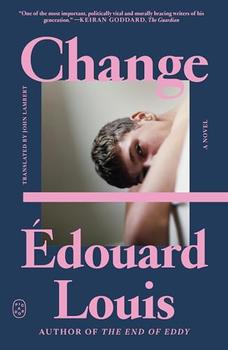Summary | Excerpt | Reviews | Beyond the Book | Readalikes | Genres & Themes | Author Bio

A Novel
by Edouard Louis
Need I tell you again how it all started? I grew up in a world that rejected everything I was, and I experienced that as an injustice because—as I repeated to myself a hundred times a day, to the point of nausea—I didn't choose what I was.
* * *
I've said all this before but I have to put it in order, I promised it to myself, the problem was diagnosed in the first years of my life: when I learned to speak, when I started to express myself, to move in the world, I heard more and more people around me asking Why does Eddy speak like that, why does he talk like a girl when he's a boy? Why does he walk like a girl? Why does he twist his hands when he speaks? Why does he look at other boys like that? Could it be that he's a bit queer?
I didn't choose to walk the way I did, to talk the way I did, I didn't understand why I had those mannerisms—that's what the people in the village called them, Eddy's mannerisms, Eddy has mannerisms when he talks—I didn't understand why those mannerisms had been imposed on me, on my body. I don't know why I was attracted to other boys' bodies and not to girls' bodies as would have been expected of me. I was a prisoner of myself. At night I dreamed of changing, of becoming someone else, and it was perhaps in those early years of my life that the idea of change became so central for me.
You were one of the first to worry. At night, when you were with Mom in your bedroom, I could hear you two talking—there were no doors between the rooms, buying doors would have cost too much money, and you'd hung up curtains you'd found at the junk shop. I could smell the cigarettes you smoked one after the next in your bed, the smoke and above all your voices reached me in the darkness, Why does Eddy talk like that? We didn't bring him up to be a queer, I don't get it. Can't he act a bit normal?
Queer. At five or six I understood that this word would define me and that it would stick with me for the rest of my life.
What you don't know, because I hid it from you, is that it followed me everywhere, not just at home but also in the streets of the village, at school, everywhere, and that you weren't the only one who worried.
* * *
(Or did you know that and just not say anything to protect yourself from the truth?)
* * *
What you also don't know is that the insults made everything else unbearable for me, our poverty, our way of life, the constant racism in the village, as if exclusion forced me to invent my own value system—one in which I had a place.
When Mom told us in the evening that we had no money and nothing to eat, the insults made the hunger even worse. When we no longer had any wood to heat the house, I suffered far worse from the cold than the others because of the insults. When I heard the women at the bakery or in the town square saying There're too many foreigners in France, nothing but Blacks everywhere you look, I despised them and spontaneously felt on the side of those they wanted to oppress and eradicate.
* * *
I don't know how it's possible to have such precise and somehow also adult and anachronistic thoughts as a child, but I remember that I wanted to leave the village and become rich, powerful and famous because I thought the power I'd gain through wealth and fame would be my revenge against you and the world that had rejected me. I'd be able to look at you and everyone else I'd known in the first part of my life, and say Look where I am now. You insulted me but today I'm more powerful than you, you were wrong to despise me and call me weak and now you're going to pay for your mistakes. You're going to pay for not loving me.
I wanted to succeed* out of revenge.
* * *
Deep down, what did you know? What didn't you know, what did you choose to ignore? Did you guess what I was going through? Did you wonder?
* * *
* * *
I never told you that when the students had to form teams in PE at school, most often to play football or handball, I was never chosen, no one wanted me on their team. (I'm not sad telling you this today, I don't want you to feel sorry for me, I just want you to know—to go back in time.)
Excerpted from Change by Edouard Louis. Copyright © 2024 by Edouard Louis. Excerpted by permission of Farrar, Straus & Giroux. All rights reserved. No part of this excerpt may be reproduced or reprinted without permission in writing from the publisher.
Your guide toexceptional books
BookBrowse seeks out and recommends the best in contemporary fiction and nonfiction—books that not only engage and entertain but also deepen our understanding of ourselves and the world around us.